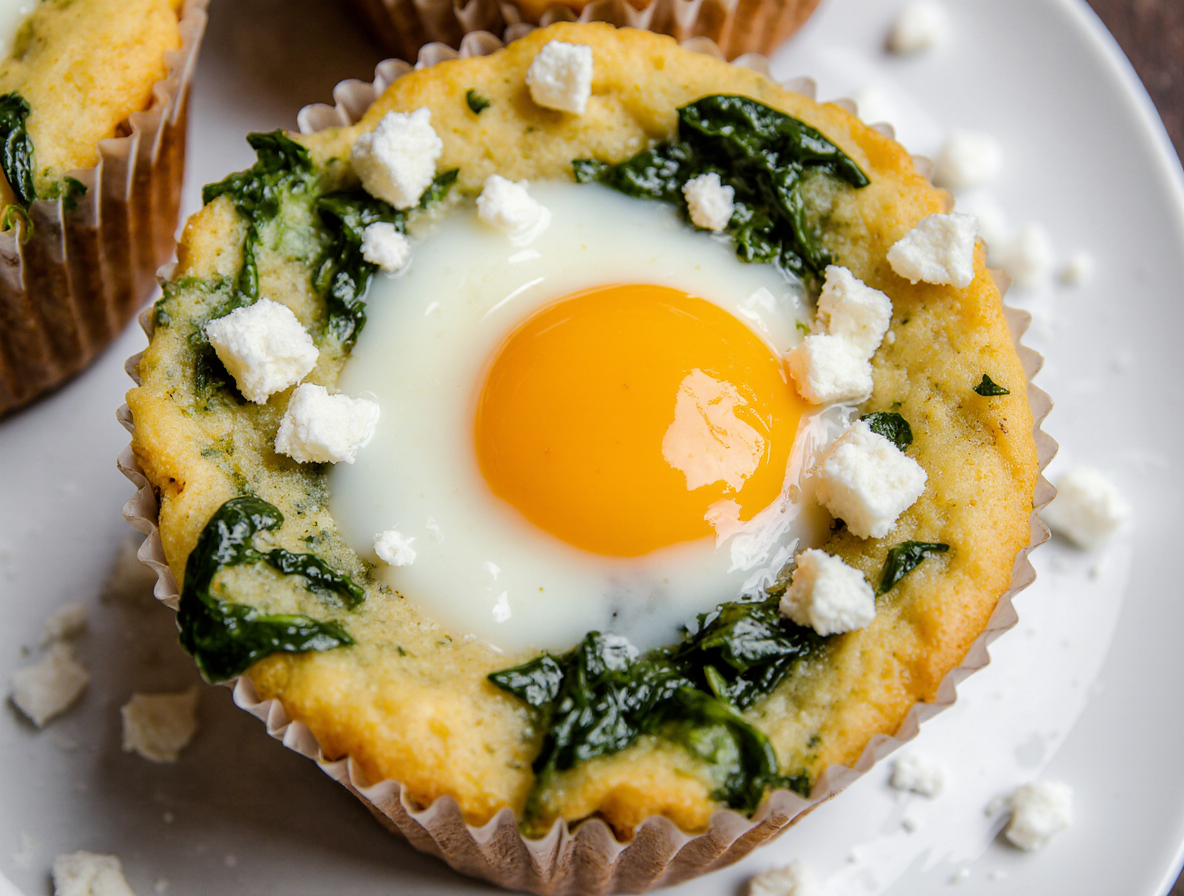The Easiest Spinach and Feta Egg Muffins You’ll Ever Make (Ready in 25 Minutes)
Spinach and feta egg muffins have become my go-to breakfast solution when I need something quick yet nutritious. Ready in just 25 minutes, these protein-packed bites contain 7 grams of protein and only 100 calories per serving, making them perfect for virtually any diet or health goal.
These spinach egg cups are specifically designed to be low carb and high protein because that combination keeps you full and satisfied. Additionally, these spinach feta egg muffins are incredibly versatile – they work well for breakfast, lunch, or even as a simple snack. What I love most about this spinach egg muffin recipe is its meal prep potential. You can prepare a batch at the beginning of the week and store them in the refrigerator for up to seven days, or freeze them for as long as three months. Inspired by the flavors of Greek spanakopita, these easy spinach and feta egg muffins combine creamy feta cheese with nutritious spinach for a delicious bite you’ll want to make again and again.
Why These Spinach and Feta Egg Muffins Work
These little powerhouses have become a staple in my morning routine for several compelling reasons. They’re not just another breakfast option—they’re a practical solution that truly works for busy lives.
Quick to make, ready in 25 minutes
Ever feel like you don’t have time for a proper breakfast? These spinach feta egg muffins come to the rescue! From start to finish, you’ll have these savory treats ready in just 20-25 minutes. The best part? Most of that time is completely hands-off while they bake in the oven. I simply whisk the eggs, add the ingredients, pour into muffin tins, and let the oven do the rest. The actual prep work takes merely minutes, making them ideal for those mornings where every second counts.
High in protein and low in carbs
What truly sets these spinach egg cups apart is their impressive nutritional profile. Each muffin packs approximately 8-12 grams of protein, providing the fuel your body needs to power through morning activities. For anyone following a low-carb lifestyle, these are a perfect choice with just 1-3 grams of carbs per muffin.
The protein content is particularly impressive considering their small size. The combination of eggs and feta creates a satisfying bite that keeps hunger at bay until lunchtime. Furthermore, if you’re looking to increase your protein intake, these muffins are an excellent way to do so without excessive calories.
Perfect for meal prep and busy mornings
In my experience, the real magic of these spinach and feta egg muffins lies in their meal prep potential. I make a batch on Sunday, and I’m set for the entire week. They store beautifully in the refrigerator for 3-5 days[42], maintaining their flavor and texture.
For longer storage, they freeze exceptionally well. Once cooled completely, you can freeze them for up to 3 months. This means you can make multiple batches at once for long-term breakfast planning.
The convenience factor cannot be overstated. On hectic mornings, I simply grab a couple of muffins, reheat them for 20-30 seconds in the microwave, and enjoy a nutritious breakfast without any morning stress. Indeed, this grab-and-go feature makes them perfect for busy professionals, parents rushing to get kids ready, or anyone who values both nutrition and convenience.
Ingredients and Easy Swaps
The beauty of these spinach feta egg muffins lies in their simplicity—minimal ingredients with maximum flavor and nutrition. Let me walk you through everything you need to create these tasty breakfast bites.
Basic ingredients you’ll need
To make a basic batch of spinach and feta egg muffins, gather these essentials:
- Eggs – You’ll need about 8-12 large eggs as your base
- Spinach – 1-2 cups, chopped (provides essential nutrients and fiber)
- Feta cheese – Around 4-5 oz or ½ cup crumbled
- Salt and pepper – Just enough to taste
- Optional seasonings – Garlic powder, dried herbs like basil or oregano enhance flavor
Moreover, don’t forget cooking spray or olive oil to prevent sticking to your muffin tin—essential for easy removal!
Using fresh vs. frozen spinach
Both fresh and frozen spinach work wonderfully in this recipe, each with distinct advantages.
Fresh spinach offers a brighter flavor but requires chopping. I recommend using about 2 cups of roughly chopped fresh spinach leaves.
Alternatively, frozen spinach is incredibly convenient since it’s pre-chopped. The key with frozen spinach: thaw completely and squeeze out excess moisture to prevent soggy muffins. Otherwise, your egg cups might turn out watery and fail to set properly.
Cheese alternatives to feta
Not a fan of feta? No problem! Try these tasty substitutes:
- Cheddar – For a milder, kid-friendly option
- Mozzarella – Creates a gooey, stretchy texture
- Goat cheese – Offers similar tanginess to feta
- Cottage cheese – ½ cup adds creaminess and extra protein
Essentially, any cheese that melts well can work in this versatile recipe.
Optional add-ins for extra flavor
Customize your spinach egg muffins with these flavorful additions:
- Vegetables: Bell peppers, tomatoes, mushrooms, or zucchini add color and nutrients
- Proteins: Cooked bacon, sausage, or diced ham for extra satiety
- Herbs: Fresh chives, parsley, or basil elevate the flavor profile
- Seasonings: Red pepper flakes for heat or smoked paprika for depth
Remember to finely chop all add-ins so they distribute evenly throughout your muffins. The possibilities are virtually endless, allowing you to create different variations each time you make them!
How to Make Spinach Feta Egg Muffins
Making spinach feta egg muffins couldn’t be easier. I’ve perfected this process through multiple batches, and the technique truly makes all the difference between mediocre breakfast bites and protein-packed perfection.
Step-by-step instructions
First of all, preheat your oven to 350°F (175°C) – this moderate temperature is crucial for properly setting the eggs without overcooking them. Next, prepare your muffin tin by generously coating it with non-stick spray or oil. This step is absolutely essential to prevent sticking.
In a large bowl, whisk together 8-9 eggs until just combined. Be careful not to overmix, as this can incorporate too much air and cause excessive rising followed by deflation. Then, add your chopped spinach (pre-cooked and drained if using frozen), crumbled feta, and seasonings like garlic powder, salt, and pepper.
Pour the mixture evenly into your prepared muffin cups, filling each about ¾ full to allow room for expansion. Bake for 18-20 minutes until the centers are set and edges begin to turn golden brown. Let cool for 5-10 minutes before removing from the pan.
Tips for using muffin tins or silicone molds
After extensive testing, I’ve found silicone muffin molds significantly outperform metal tins for egg muffins. Silicone cups release the eggs effortlessly without the need for excessive greasing or liners. Nevertheless, even with silicone, I still recommend a light coating of oil.
Metal muffin pans, though common, often lead to stuck-on eggs that tear apart during removal. Furthermore, they tend to cook eggs faster and can easily result in rubbery edges before the centers fully set.
Avoid paper liners completely – they’ll become soggy and stick to your egg muffins, making removal frustrating. For best results, consider investing in individual silicone cups rather than a full silicone pan, as they’re easier to handle and clean.
How to avoid soggy or rubbery texture
The most common complaint with egg muffins is texture problems. To prevent sogginess, always pre-cook vegetables with high water content like spinach, mushrooms, or zucchini, and thoroughly drain them. Raw vegetables release moisture during baking, consequently creating soggy muffins.
To avoid the dreaded rubbery texture, watch your baking time carefully. Overcooked egg muffins become tough and chewy. Therefore, remove them from the oven as soon as they’re set in the center. Using a water bath (adding warm water to the sheet pan under your muffin cups) helps maintain moisture while cooking for a tender result.
For best texture, allow the egg muffins to cool for about 10-15 minutes before serving or storing, as they continue cooking slightly after removal from the oven.
Storing, Freezing, and Reheating Tips
One of the biggest advantages of spinach and feta egg muffins is their excellent make-ahead potential. Let me share my tested storage methods to help you enjoy these delicious egg cups all week long.
How to store in the fridge
Firstly, always allow your spinach egg cups to cool completely before storing. This prevents condensation that can make them soggy. Place the cooled muffins in an airtight container, ideally with paper towels between layers to absorb excess moisture. These egg muffins will stay fresh in the refrigerator for up to 4-5 days.
Alternatively, you can wrap individual muffins tightly in plastic wrap for added freshness protection. This method is particularly helpful if you plan to grab just one or two at a time throughout the week.
Freezing instructions for long-term use
For longer storage, spinach feta egg muffins freeze beautifully. After cooling completely, wrap each muffin individually in plastic wrap. This crucial step prevents freezer burn and preserves texture. Afterward, place the wrapped muffins in a freezer-safe ziplock bag or airtight container.
Properly stored, these egg muffins will maintain quality in the freezer for 2-3 months. Obviously, labeling with the date is helpful to track freshness. For best results, lay the bag flat in the freezer until muffins are completely frozen.
Best ways to reheat without drying out
Reheating properly is essential to maintain the delicious texture of your spinach and feta egg muffins. Here are the best methods:
Microwave Method:
- From refrigerated: Wrap in a damp paper towel and microwave for 20-30 seconds
- From frozen: Remove plastic wrap, wrap in a damp paper towel, and microwave for 60-90 seconds
Oven Method:
- Preheat to 350°F
- Place muffins on a baking sheet
- Heat for 5-10 minutes until warmed through
Air Fryer Option:
- Heat at 375°F for 3-5 minutes[213]
Above all, be careful not to overcook when reheating—this can make your egg muffins rubbery and tough. Besides the standard methods, you can also try reheating at 50% microwave power for a longer time to prevent sogginess.
Conclusion
Spinach and feta egg muffins certainly stand out as a game-changer for busy mornings and health-conscious meal planning. After making these regularly for several months, their simplicity and nutritional benefits have transformed my breakfast routine completely. The perfect balance of protein and minimal carbs keeps me energized throughout the morning, while the quick 25-minute preparation fits seamlessly into my schedule.
These egg muffins offer unquestionably more than just convenience. Their versatility allows endless customization based on whatever ingredients you have available. One week, I might add bell peppers and cheddar; the next, perhaps mushrooms and mozzarella take center stage. Additionally, their excellent storage properties make them ideal for weekly meal prep – something I now consider essential for maintaining healthy eating habits despite a hectic schedule.
The practical storage and reheating methods outlined earlier ensure these muffins remain delicious days after preparation. My personal favorite approach involves making a double batch on Sunday, refrigerating half for the coming week, and freezing the remainder for later use. This strategy provides nearly two weeks of grab-and-go breakfasts with minimal effort.
These spinach and feta egg muffins represent everything practical home cooking should be – nutritious, time-saving, and genuinely delicious. Their Greek-inspired flavors paired with meal-prep convenience make them a breakfast solution worth adding to your regular rotation. Give this recipe a try next weekend, and you might find yourself, much like me, wondering how you ever managed mornings without them.
FAQs
Q1. How do you make spinach and feta egg muffins? Preheat the oven to 350°F, whisk eggs in a bowl, add chopped spinach, crumbled feta, and seasonings. Pour the mixture into a greased muffin tin and bake for 18-20 minutes until set. Let cool before serving.
Q2. What’s the secret to fluffy egg muffins? The key to fluffy egg muffins is not overmixing the eggs and adding ingredients like all-purpose flour and baking powder. These help create a light, puffy structure while maintaining stability during baking.
Q3. How can you tell when egg muffins are fully cooked? Egg muffins are done when the centers are set and the edges begin to turn golden brown, typically after 18-20 minutes of baking. You can also insert a knife into the center – if it comes out clean, the muffins are ready.
Q4. Is milk necessary for egg muffins? While milk isn’t absolutely necessary, adding a small amount (about 1/3 cup) can improve the texture of egg muffins. Whole milk works best, but low-fat or non-dairy alternatives can also be used. Without milk, the muffins may taste dry.
Q5. How long can you store spinach and feta egg muffins? These egg muffins can be stored in an airtight container in the refrigerator for up to 4-5 days. For longer storage, you can freeze them for up to 2-3 months. Always allow them to cool completely before storing.


